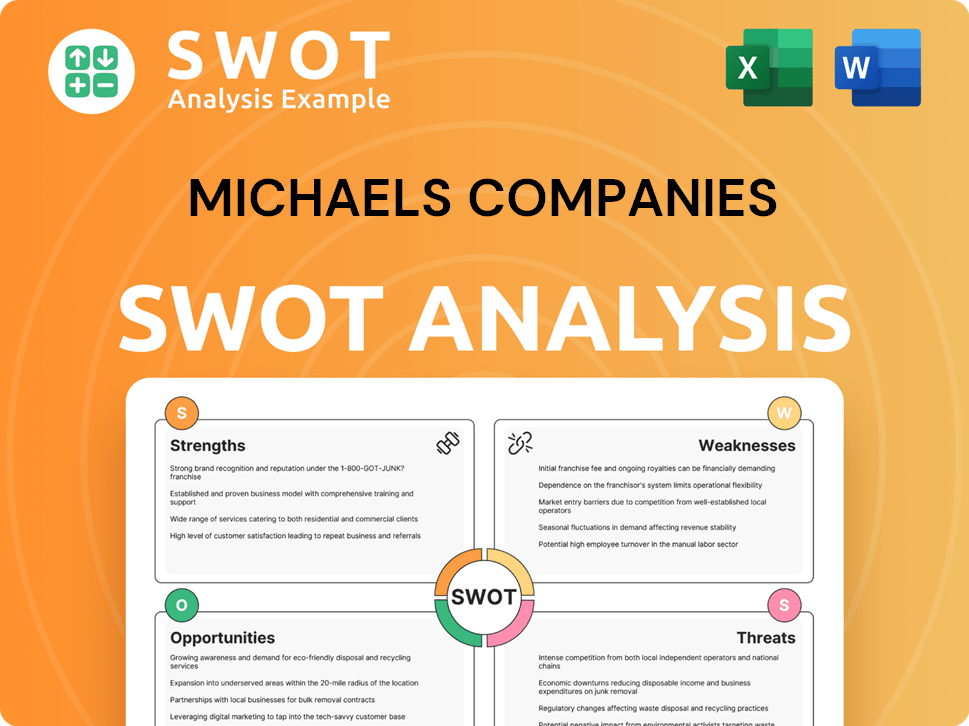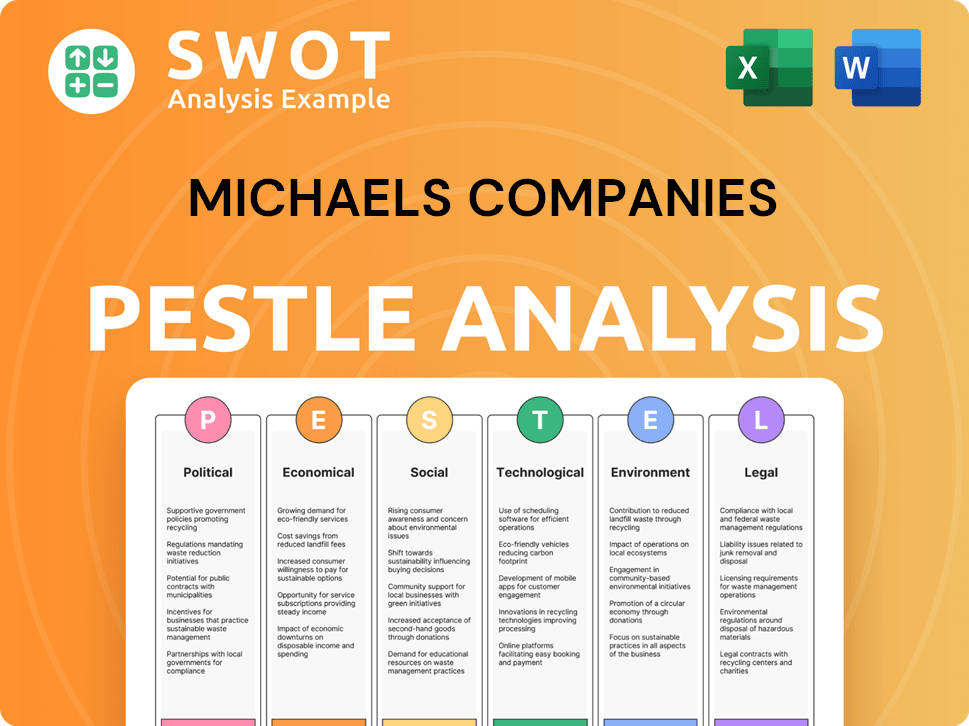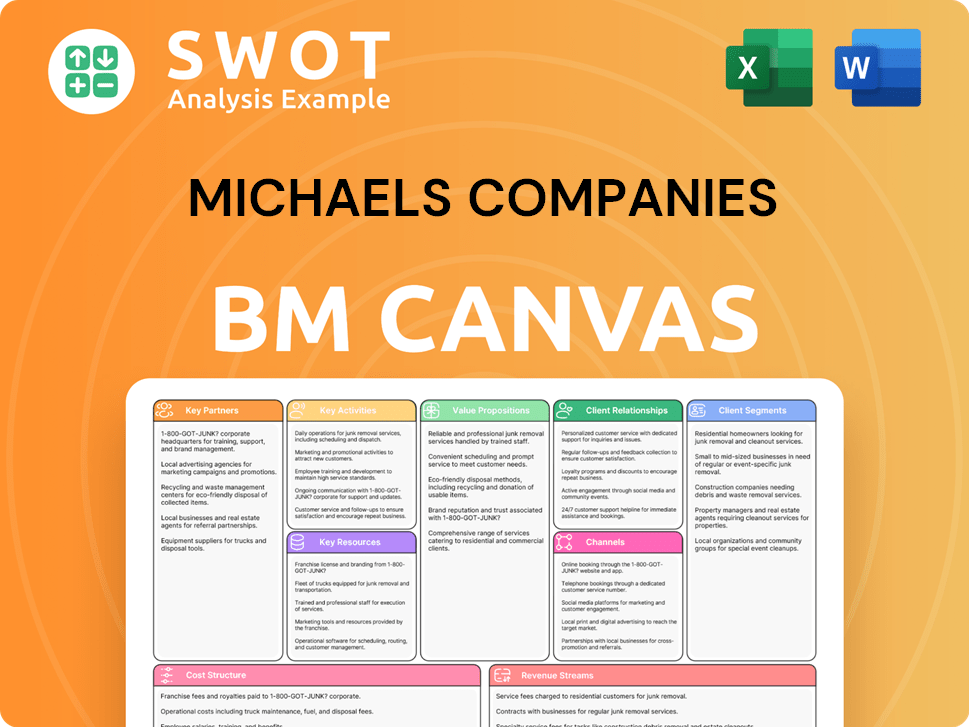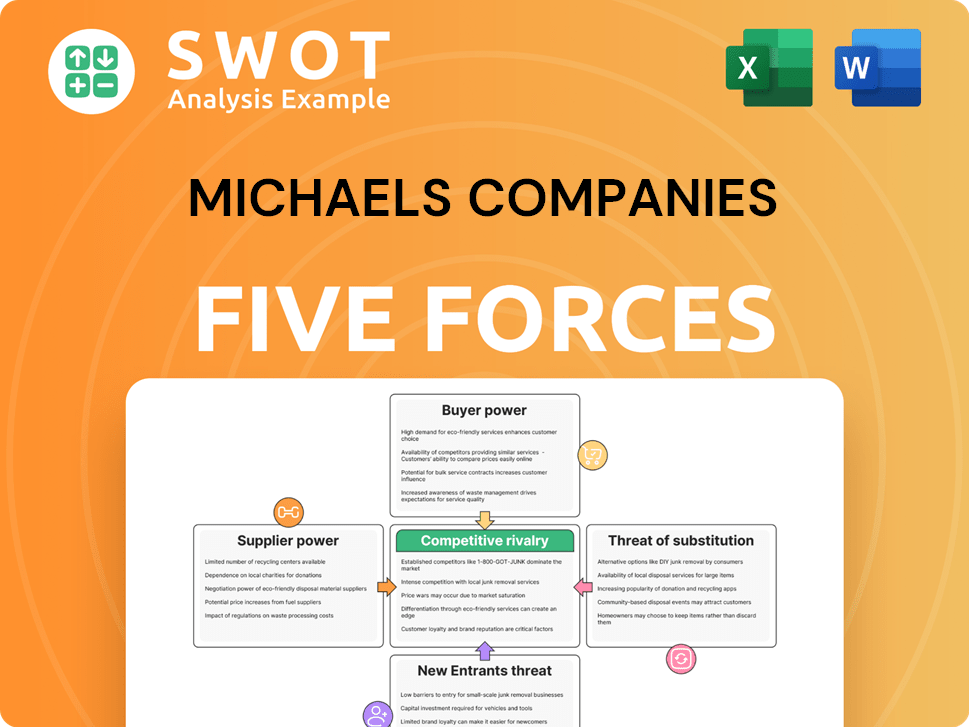Michaels Companies Bundle
How Does Michaels Companies Thrive in the Craft Retail World?
Michaels Companies, a prominent name in the arts and crafts retail sector, caters to a vast community of hobbyists and DIY enthusiasts across North America. With a widespread network of Michaels store locations and a growing online presence, the company plays a vital role in supplying materials for creative endeavors. Understanding the intricacies of Michaels' operations is crucial for anyone interested in the retail landscape, especially given the ever-changing consumer preferences and shopping habits.

Michaels' influence extends beyond mere product sales; it fosters a vibrant community around creativity, offering inspiration and resources that empower individuals. The company's ability to adapt to trends, such as the shift to online shopping, impacts its financial performance. For a deeper dive into the strategic landscape, consider exploring the Michaels Companies SWOT Analysis to understand its strengths, weaknesses, opportunities, and threats.
What Are the Key Operations Driving Michaels Companies’s Success?
The core of The Michaels Companies, Inc.'s operations revolves around providing a wide array of arts, crafts, framing, floral, home décor, and seasonal merchandise. The company's value proposition centers on serving hobbyists, crafters, artists, and DIY decorators. They cater to diverse creative interests and skill levels through a dual-channel approach, combining physical retail locations with an expanding e-commerce platform.
Operationally, the company focuses on efficient sourcing and inventory management to ensure a vast selection of products. This involves a complex supply chain that procures goods from numerous global vendors. The company uses its scale to secure favorable terms and maintain competitive pricing. Their strategy includes in-store customer service, product accessibility, and an inspiring shopping environment, often featuring project ideas and displays. The digital platform complements the physical stores by offering an extended product assortment and convenient online ordering.
The Michaels Companies, Inc. also provides custom framing services, adding a specialized value proposition for customers seeking personalized solutions. This unique approach allows them to manage a vast and diverse product catalog while fostering a creative community through in-store workshops and online content. This differentiates them from general merchandise retailers, offering convenience, variety, expert advice, and inspiration to customers. Learn more about the company's origins in this Brief History of Michaels Companies.
The Michaels Companies operates a vast network of physical stores, offering a tangible shopping experience. These stores are designed to be inspirational spaces, featuring project ideas and product displays. The physical locations are crucial for providing immediate access to products and fostering a sense of community among crafters and artists. In 2024, the company had approximately 1,300 stores across North America.
The company offers a comprehensive range of products, including arts and crafts supplies, framing services, and home décor items. This diverse product selection caters to various creative interests and skill levels. The inclusion of custom framing services enhances the value proposition. The Michaels craft store also provides classes and workshops to engage customers.
The Michaels online store complements the physical locations by offering an extended product assortment and convenient online ordering. This omnichannel approach allows customers to shop anytime, anywhere, and choose from various fulfillment options, including in-store pickup and home delivery. The digital platform enhances the overall customer experience.
The Michaels business model is built on a combination of retail sales, custom framing services, and online sales. The company leverages its scale to negotiate favorable terms with suppliers and maintain competitive pricing. Michaels make money by selling a wide variety of products and services. The company also focuses on creating a loyal customer base through its rewards program and in-store experiences.
The operational focus includes efficient sourcing, inventory management, and customer service. The company manages a vast and diverse product catalog while fostering a creative community. The company's ability to manage a vast and diverse product catalog is a key differentiator.
- Efficient Supply Chain: Procuring goods from numerous global vendors.
- Customer Experience: Emphasis on in-store customer service and inspiring environments.
- Digital Integration: Utilizing an e-commerce platform for extended product offerings and convenience.
- Community Building: Fostering creativity through in-store workshops and online content.
Michaels Companies SWOT Analysis
- Complete SWOT Breakdown
- Fully Customizable
- Editable in Excel & Word
- Professional Formatting
- Investor-Ready Format

How Does Michaels Companies Make Money?
The primary revenue stream for The Michaels Companies comes from direct sales of arts, crafts, and related merchandise. This includes items like framing, floral arrangements, home décor, and seasonal products. The company operates through both physical retail locations, often referred to as the Michaels store, and an online platform, Michaels.com.
The Michaels craft store generates revenue by selling a wide array of products. While specific percentages for each sales channel aren't always publicly detailed, the company has consistently highlighted the importance of its online presence for growth and customer engagement. This omnichannel approach is key to their business strategy.
The company employs several monetization strategies to boost its revenue. These include custom framing services, which provide higher profit margins, and customer loyalty programs designed to encourage repeat purchases. In-store classes and workshops, while not a primary revenue source, historically contributed to customer engagement and indirectly boosted product sales. The company's strategic focus revolves around enhancing its omnichannel capabilities to improve customer reach and convenience, which helps to optimize overall sales.
The Michaels business model relies heavily on product sales, especially through its physical stores and online platform. The company also uses services like custom framing to generate revenue. Customer loyalty programs and personalized marketing are also important strategies for increasing sales and customer lifetime value. To learn more about who they are targeting, read this article about Target Market of Michaels Companies.
- Product Sales: The core revenue driver, encompassing a vast selection of arts, crafts, framing, floral, home décor, and seasonal merchandise.
- Custom Framing Services: Offers higher profit margins and adds value to the product offerings.
- Loyalty Programs and Personalized Marketing: Encourages repeat purchases and increases customer lifetime value.
- Omnichannel Strategy: Integrates physical and digital presence to maximize customer reach and optimize sales.
Michaels Companies PESTLE Analysis
- Covers All 6 PESTLE Categories
- No Research Needed – Save Hours of Work
- Built by Experts, Trusted by Consultants
- Instant Download, Ready to Use
- 100% Editable, Fully Customizable

Which Strategic Decisions Have Shaped Michaels Companies’s Business Model?
The evolution of The Michaels Companies has been marked by strategic adaptations to maintain its leadership in the arts and crafts retail sector. A key focus has been the enhancement of its e-commerce capabilities, particularly during and after the pandemic. This shift allowed the company to broaden its reach and cater to the changing shopping behaviors of its customers. Furthermore, the company has actively managed its store footprint, optimizing locations and renovating stores to improve the customer experience.
Operational challenges, such as supply chain disruptions, have prompted Michaels to diversify its sourcing and refine its inventory management. Competition from mass merchandisers and online retailers has driven Michaels to emphasize its unique product offerings, community engagement through crafting events, and expert advice. These strategic moves are designed to reinforce its market position and ensure long-term relevance.
The company's competitive edge stems from its strong brand recognition and extensive network of Michaels store locations, which provide immediate access to products and in-person inspiration. Its wide-ranging product selection, including exclusive brands, differentiates it from general retailers. By continually refreshing its merchandise, investing in digital tools, and engaging with customers on social media, Michaels aims to stay competitive and meet evolving consumer needs. Read more about the Growth Strategy of Michaels Companies.
Michaels has consistently adapted to market changes. The expansion of its online store has been a significant move. The company has also focused on optimizing its physical store presence.
Strategic initiatives include enhancing e-commerce and managing its store footprint. Michaels has invested in supply chain improvements. The company emphasizes unique product offerings and community engagement.
Michaels benefits from strong brand recognition and a vast store network. The company offers a wide product selection, including exclusive brands. It leverages digital tools and social media for customer engagement.
In fiscal year 2023, Michaels reported net sales of approximately $5.3 billion. The company continues to invest in its digital platforms to enhance the online shopping experience. Michaels is also focused on expanding its private brand offerings.
Michaels has faced supply chain disruptions and intense competition. The company has responded by diversifying its sourcing and improving logistics. It emphasizes its specialized product assortment and community engagement to counter competition.
- Supply chain diversification to mitigate risks.
- Focus on exclusive brands and unique items.
- Community engagement through crafting events.
- Investment in digital tools for crafters.
Michaels Companies Business Model Canvas
- Complete 9-Block Business Model Canvas
- Effortlessly Communicate Your Business Strategy
- Investor-Ready BMC Format
- 100% Editable and Customizable
- Clear and Structured Layout

How Is Michaels Companies Positioning Itself for Continued Success?
The Michaels Companies, a leading name in the arts and crafts retail sector, holds a significant industry position, particularly in North America. The company's expansive network of Michaels store locations and growing online presence contribute to a substantial market share and strong brand recognition. It caters to a loyal customer base of hobbyists and DIY enthusiasts.
However, the company faces several risks, including economic downturns affecting discretionary spending and intense competition from major retailers and online craft stores. Adapting to changing consumer preferences and managing supply chain disruptions are also key challenges. Navigating these challenges requires a proactive approach to maintain profitability and market leadership. For example, the company's ability to adapt to online retail, as detailed in Owners & Shareholders of Michaels Companies, is crucial.
The Michaels craft store is a market leader in the arts and crafts retail industry in North America. It has a strong brand recognition and a large customer base of hobbyists and DIY enthusiasts. The company's extensive store network and online presence contribute to its significant market share.
Economic downturns can impact discretionary spending on arts and crafts supplies. The company faces intense competition from large general merchandise retailers like Walmart and Amazon. Shifting consumer preferences and supply chain disruptions also pose challenges. These factors can affect the Michaels business model.
The company plans to enhance its omnichannel retail experience, integrating physical and digital channels. It will focus on optimizing its product assortment and investing in technology for improved customer personalization. The company is committed to fostering creativity and building a strong community around crafting.
Michaels is focused on expanding its online presence and improving its e-commerce platform. The company aims to introduce new and trending items to keep pace with evolving creative interests. Investments in data analytics are aimed at improving customer personalization and operational efficiency.
Michaels aims to sustain and expand its market position by being the preferred destination for creative supplies. This involves leveraging its brand strength and extensive product range. The company's customer-centric approach is crucial for navigating competitive pressures.
- Enhancing the omnichannel retail experience.
- Optimizing product assortment to meet evolving consumer demands.
- Investing in technology to improve customer personalization.
- Building a strong community around crafting.
Michaels Companies Porter's Five Forces Analysis
- Covers All 5 Competitive Forces in Detail
- Structured for Consultants, Students, and Founders
- 100% Editable in Microsoft Word & Excel
- Instant Digital Download – Use Immediately
- Compatible with Mac & PC – Fully Unlocked

Related Blogs
- What are Mission Vision & Core Values of Michaels Companies Company?
- What is Competitive Landscape of Michaels Companies Company?
- What is Growth Strategy and Future Prospects of Michaels Companies Company?
- What is Sales and Marketing Strategy of Michaels Companies Company?
- What is Brief History of Michaels Companies Company?
- Who Owns Michaels Companies Company?
- What is Customer Demographics and Target Market of Michaels Companies Company?
Disclaimer
All information, articles, and product details provided on this website are for general informational and educational purposes only. We do not claim any ownership over, nor do we intend to infringe upon, any trademarks, copyrights, logos, brand names, or other intellectual property mentioned or depicted on this site. Such intellectual property remains the property of its respective owners, and any references here are made solely for identification or informational purposes, without implying any affiliation, endorsement, or partnership.
We make no representations or warranties, express or implied, regarding the accuracy, completeness, or suitability of any content or products presented. Nothing on this website should be construed as legal, tax, investment, financial, medical, or other professional advice. In addition, no part of this site—including articles or product references—constitutes a solicitation, recommendation, endorsement, advertisement, or offer to buy or sell any securities, franchises, or other financial instruments, particularly in jurisdictions where such activity would be unlawful.
All content is of a general nature and may not address the specific circumstances of any individual or entity. It is not a substitute for professional advice or services. Any actions you take based on the information provided here are strictly at your own risk. You accept full responsibility for any decisions or outcomes arising from your use of this website and agree to release us from any liability in connection with your use of, or reliance upon, the content or products found herein.